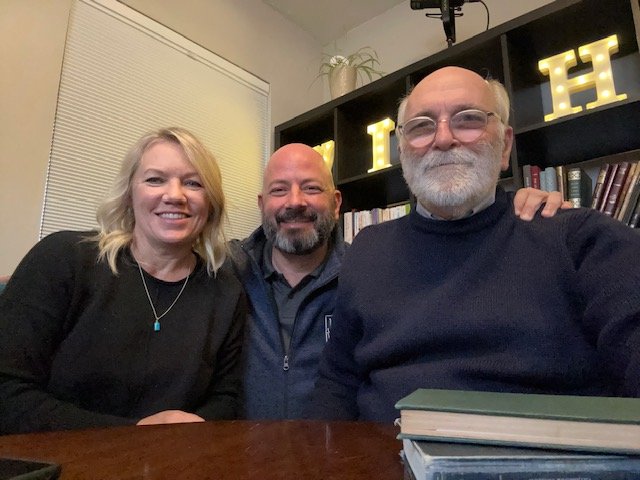Why Does Pain Exist? A Discussion with Dr. Jerry Root
With the inevitability of pain and suffering in our world, a typical human response is to avoid it or try to make meaning of it. In this episode, we attempt to face hard questions head-on as we discuss insights from C.S. Lewis from his book “The Problem of Pain.” We are joined by Dr. Jerry Root, an expert on Lewis’s writings, to dive deep into ideas of how to approach pain with a sense of hope instead of despair.
—-
Dr. Jerry Root is professor emeritus at Wheaton College, and for over 41 years, Dr. Root has lectured on C.S. Lewis topics at 78 universities in 18 countries. He is the author of numerous C.S. Lewis-focused books, articles, and publications. He is married to Claudia Root and together they have four married children and 15 grandchildren.
Connect with Jerry Root on his website: https://www.drjerryroot.com/
—
produced by Zach Van Dyke
—-
C.S. Lewis quotes from The Problem of Pain:
“Try to exclude the possibility of suffering which the order of nature and the existence of free-wills involve, and you find that you have excluded life itself.”
“Mental pain is less dramatic than physical pain, but it is more common and also more hard to bear. The frequent attempt to conceal mental pain increases the burden: it is easier to say ‘My tooth is aching’ than to say ‘My heart is broken.’ “
—
Books and resources Dr. Root recommends for further reading:
Alighieri, Dante. The Divine Comedy. Aegitas, 2017.
———. The Convivio of Dante Alighieri. JM Dent and Company, 1912.
———. De Monarchia: Of Monarchy. Jazzybee Verlag, 2019.
Alighieri, Dante, and Andrew Frisardi. Vita Nova. 2012.
Aquinas, Thomas. On Evil. Oxford University Press, 2003.
Beirne, Margaret. "St Irenaeus and the Scriptures." Phronema 34, no. 2 (2019).
Bliss, P. P., Horatio G. Spafford, and W. H. Sims. It Is Well with My Soul. Good Life Publications, 1982.
Boethius, Anicius, and Scott Goins. The Consolation of Philosophy: With an Introduction and Contemporary Criticism. Ignatius Press, 2011.
Chesterton, G. K. Tremendous Trifles. Dodd, Mead, 1917.
The quote, "The world will never starve for want of wonders, but only for want of wonder," appears in the essay "The Wind and the Trees" found in Tremendous Trifles (1909).
Dostoyevsky, Fyodor. The Brothers Karamazov. Penguin UK, 2003.
Ivan posits that if there is no God, there is no morality, and everything is permissible. His brother Alyosha senses the presence of God but faces a crisis of faith, finding resolution through suffering. The novel delves into deep philosophical and theological questions. — Jerry Root
Frankel, Estelle. The Wisdom of Not Knowing: Discovering a Life of Wonder by Embracing Uncertainty. Shambhala Publications, 2017.
Lewis, C. S. Surprised by Joy: The Shape of My Early Life. Houghton Mifflin Harcourt, 1956.
———. Reflections on the Psalms. Houghton Mifflin Harcourt, 1958.
———. Letters to Malcolm: Chiefly on Prayer. 1964.
———. The Abolition of Man. Zondervan, 2001.
———. The Problem of Pain. Zondervan, 2001.
———. A Grief Observed. Zondervan, 2001.
———. The Chronicles of Narnia. Harper Collins, 2001.
———. The Allegory of Love. Cambridge University Press, 2013.
———. The Great Divorce. DigiCat, 2022.
Pascal, Blaise, and Hugh F. Stewart. Pascal's Pensées. Routledge, 2020.
Pascal emphasizes that Christ's humility in the Incarnation and crucifixion is central to understanding God's love.
Spisak, April. "The Mythmakers: The Remarkable Fellowship of C. S. Lewis and J. R. R. Tolkien by John Hendrix." Bulletin of the Center for Children's Books 78, no. 1 (2024): 3–4.
Thompson, W. H. The Gorgias of Plato. Whittaker, 1871.
Plato explores rhetoric and its relationship to justice, virtue, and manipulation.
Vanauken, Sheldon. A Severe Mercy. Bantam Books, 1979.
This memoir recounts Vanauken's love story, conversion to Christianity, and friendship with C. S. Lewis.
Vujicic, Nick. Life Without Limits: Inspiration for a Ridiculously Good Life. WaterBrook, 2012
So fortunate to have Dr. Jerry Root with us in our home studio!
Jerry & Claudia Root


